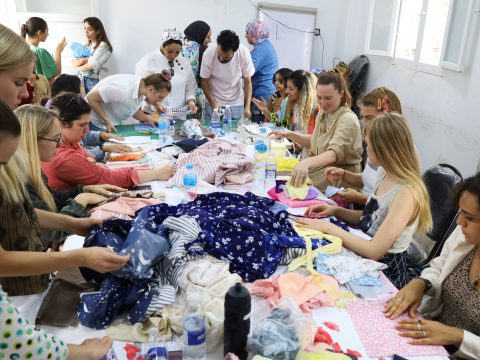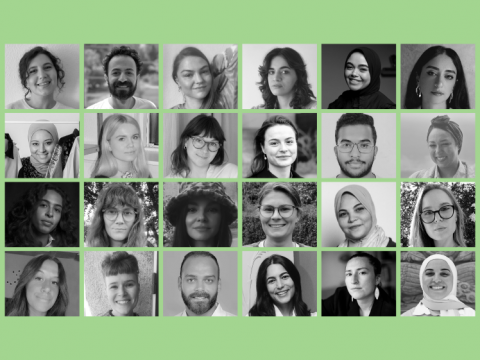The latest VR technologies, traditional quilt-making techniques and many visits to local sustainable fashion hubs inspire collaborations and inspire the 23 participants of DEDI Green Gate in Egypt.
By Rowan El Shimi
Everyday local fishermen at Qursaya Island take their boats out into the Nile. But it’s not fish they are after – it’s plastic waste which they collect literal tons of and bring back to VeryNile where it gets sorted, compressed, sold to recycling facilities and upcycled into trendy bags, hats and more. This was what the group of Danish and Egyptian fashion designers and social entrepreneurs witnessed at their visit to the initiative.
“We saw at VeryNile how they turn plastic waste into yarn and how they knit and crochet and make products out of that,” Linda Nyvang describes the women’s workshop. “I’m very interested in the handcrafts and how to take for example plastic waste and make it into products.”
Linda Nyvang is a Danish artist and designer studying at the Royal Danish Academy specialized in weaving and print design. She is one of the 23 Danish and Egyptian participants taking part in DEDI Green Gate 2022, an exchange program focused on sustainable fashion aiming to promote innovation, offer inspiration and know-how to designers and social entrepreneurs.
“I learned that there are a lot of opportunities to work with waste materials and for me that is especially interesting because I use textiles, yarns and deadstock materials so visiting different companies that work with waste materials and how to organize it and utilize the materials has been especially inspiring,” Linda Nyvang continues during the second international workshop of DEDI Green Gate taking place in Cairo, Egypt.




![DEDI Green Gate EG 2022-21 Designer and artist Linda Nyvang is inspired to find new ways to work with waste materials. (Photo: Rowan El Shimi // DEDI)]](https://dedi.org.eg/wp-content/uploads/2022/12/DEDI-Green-Gate-EG-2022-21-scaled.jpg)
![DEDI Green Gate EG 2022-72 Salma Ellakany, Project Manager at VeryNile shows the participants their process at the workshop creating products from plastic. (Photo: Rowan El Shimi // DEDI)]](https://dedi.org.eg/wp-content/uploads/2022/12/DEDI-Green-Gate-EG-2022-72-scaled.jpg)
![DEDI Green Gate EG 2022-47 Bassant Sherif at Almah shows the participants variations of the traditional tentmakers quilting technique that they can apply to the products they choose to make during the workshop. (Photo: Rowan El Shimi // DEDI)]](https://dedi.org.eg/wp-content/uploads/2022/12/DEDI-Green-Gate-EG-2022-47-scaled.jpg)
![DEDI Green Gate EG 2022-54 Bassant Sherif at Almah shows the participants variations of the traditional tentmakers quilting technique that they can apply to the products they choose to make during the workshop. (Photo: Rowan El Shimi // DEDI)]](https://dedi.org.eg/wp-content/uploads/2022/12/DEDI-Green-Gate-EG-2022-54-scaled.jpg)
![DEDI Green Gate EG 2022-36 Abdelkader El Khaligy and other participants making products at Almah’s workshop for the hands-on component of DEDI Green Gate. (Photo: Rowan El Shimi // DEDI)]](https://dedi.org.eg/wp-content/uploads/2022/12/DEDI-Green-Gate-EG-2022-36-scaled.jpg)
![DEDI Green Gate EG 2022-23 Learning is not just for the participants! Even facilitator Sonja Katharina Zipelius acquired new sowing skills from a local craftswoman at Almah’s workshop: (Photo: Rowan El Shimi // DEDI)]](https://dedi.org.eg/wp-content/uploads/2022/12/DEDI-Green-Gate-EG-2022-23-scaled.jpg)
![DEDI Green Gate 18 The final product – a pouch – by participant Anna Poulsen. (Photo: Rowan El Shimi // DEDI)]](https://dedi.org.eg/wp-content/uploads/2022/12/IMG_9301-2-scaled.jpeg)



![DEDI Green Gate EG 2022-01 Nermine Farahat, sustainability consultant and lecturer, runs a follow up session on how to connect various elements of sustainability in your business model. (Photo: Rowan El Shimi // DEDI)]](https://dedi.org.eg/wp-content/uploads/2022/12/DEDI-Green-Gate-EG-2022-01-scaled.jpg)
![DEDI Green Gate EG 2022-09 A group of participants present their business model during the training at Consoleya. (Photo: Rowan El Shimi)]](https://dedi.org.eg/wp-content/uploads/2022/12/DEDI-Green-Gate-EG-2022-09-scaled.jpg)



